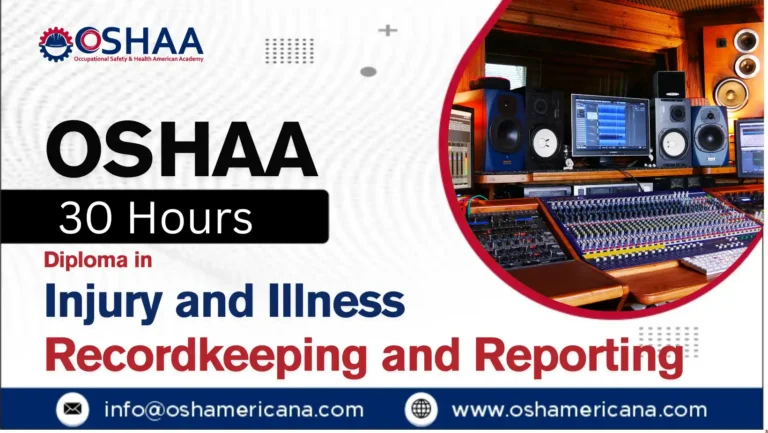In today’s globalized food supply chain, safeguarding products from malicious threats has become a top priority for industry professionals and regulatory bodies alike. The OSHAA 30-Hours Diploma in Threat Assessment and Critical Control Points (TACCP) is designed to equip individuals and organizations with the skills needed to assess and control intentional threats to food safety. This diploma is not only a valuable credential for professionals in the food industry, but also a proactive step towards comprehensive food defence strategies.
Threat Assessment and Critical Control Points, commonly known as TACCP, is a systematic management process used to identify and mitigate threats to food and beverage products from deliberate contamination or attack. Unlike HACCP, which focuses on unintentional food safety hazards, TACCP addresses issues such as sabotage, extortion, espionage and food fraud. This distinction makes TACCP an essential component of any food defence plan.
The OSHAA 30-Hours Diploma in TACCP is a robust programme that provides in-depth knowledge of food defence principles, threat identification, vulnerability assessments, and the implementation of protective measures. It is ideal for quality assurance managers, food safety officers, supply chain professionals, and anyone responsible for the integrity of food production and distribution systems.
In an era where food security is a growing concern, proactive measures are essential. The OSHAA 30-Hours Diploma in Threat Assessment and Critical Control Points empowers professionals to safeguard their organizations against intentional threats, ensuring the integrity of the food supply chain.
OSHAA 30-Hours Diploma in Threat Assessment and Critical Control Points (TACCP)
Study Units
Learning Outcomes
Introduction to Food Defence and TACCP Concepts (3 hours)
- Demonstrate a comprehensive understanding of food defence principles within the context of the global food industry
- Distinguish between TACCP, VACCP, and HACCP as complementary components of food safety and defence
- Articulate the significance of TACCP in identifying and managing intentional contamination threats
- Examine the historical evolution and strategic need for threat-based food protection systems
Understanding Types of Threats and Motivations (3 hours)
- Identify a range of intentional threats including sabotage, terrorism, food fraud, and economically motivated adulteration
- Analyse internal and external threat vectors impacting food systems
- Evaluate psychological, ideological, and economic motivations behind deliberate acts against the food supply
- Assess case studies to contextualise threat behaviour and patterns
Threat and Vulnerability Assessment Methodologies (4 hours)
- Apply systematic approaches to threat identification and vulnerability assessment
- Utilise risk-based tools to evaluate the likelihood and severity of intentional food threats
- Prioritise vulnerabilities based on strategic, operational, and supply chain criteria
- Interpret assessment outcomes to inform risk mitigation and control strategies
Formation and Responsibilities of a TACCP Team (5 hours)
- Establish a multidisciplinary TACCP team with defined governance and authority
- Identify core competencies, responsibilities, and training requirements for team members
- Develop internal communication protocols to support effective collaboration and threat response
- Coordinate TACCP team activities in alignment with organisational objectives and regulatory expectations
Conducting TACCP Studies and Analysis (4 hours)
- Implement a structured methodology to conduct comprehensive TACCP studies
- Identify critical areas and operational points susceptible to intentional interference
- Collect and analyse qualitative and quantitative data relevant to threat scenarios
- Produce actionable insights and recommendations based on risk assessment findings
Developing and Documenting a TACCP Plan (3 hours)
- Design a fully compliant TACCP plan incorporating risk assessments and mitigation strategies
- Ensure accurate, consistent, and auditable documentation of all TACCP activities
- Integrate the TACCP plan with overarching food safety and quality management systems
- Support organisational readiness for external audits and regulatory reviews
Preventive Measures and Control Point Management (5 hours)
- Implement effective deterrence, detection, and prevention strategies tailored to identified threats
- Establish physical, procedural, and personnel controls to protect critical processes and products
- Monitor and validate control points to ensure sustained threat management effectiveness
- Enhance resilience and responsiveness through continuous performance evaluation
Regulatory and Global Standards Alignment (3 hours)
- Interpret the legal and regulatory framework governing food defence and TACCP implementation
- Align internal TACCP systems with global food safety standards including BRCGS, ISO 22000, and GFSI requirements
- Demonstrate conformance through appropriate documentation, training, and operational controls
- Strengthen corporate compliance and food safety culture through regulatory best practices
- Enhances professional expertise in food defence, equipping individuals with the skills to identify, assess, and mitigate intentional threats within the food supply chain
- Strengthens organisational resilience by supporting the implementation of a structured and proactive TACCP framework
- Promotes compliance with global food safety standards such as BRCGS, ISO 22000, and GFSI-recognised schemes, reinforcing regulatory and audit preparedness
- Supports risk-based decision-making through the application of systematic threat and vulnerability assessment methodologies
- Improves internal collaboration through the development of cross-functional TACCP teams with clearly defined responsibilities
- Increases consumer and stakeholder confidence by demonstrating a commitment to product integrity and supply chain security
- Facilitates integration of TACCP with existing food safety management systems, enhancing overall operational efficiency and food protection strategies
- Provides industry-recognised certification, adding value to individual professional development and career progression
- Prepares participants to lead TACCP initiatives, audits, and continuous improvement activities within their organisations
- Encourages a proactive food defence culture, reducing the risk of economic loss, brand damage, and public health threats resulting from deliberate contamination events
The OSHAA 30-Hours Diploma in Threat Assessment and Critical Control Points (TACCP) is designed for professionals and organisations across the food and beverage sector who are responsible for ensuring product safety, integrity, and compliance. This course is particularly relevant for:
- Food safety and quality assurance professionals seeking to expand their expertise in food defence
- Supply chain and logistics managers responsible for safeguarding products throughout distribution networks
- Production and operations managers aiming to strengthen on-site protection measures
- Technical and compliance officers tasked with regulatory adherence and audit readiness
- Risk managers and corporate security personnel involved in vulnerability assessments and mitigation planning
- Consultants and auditors working within the framework of GFSI-recognised standards and certification schemes
- Professionals pursuing career development in food safety, quality systems, or food defence leadership roles
This diploma is suitable for both experienced professionals and those looking to build foundational knowledge in threat assessment and intentional food risk control.







